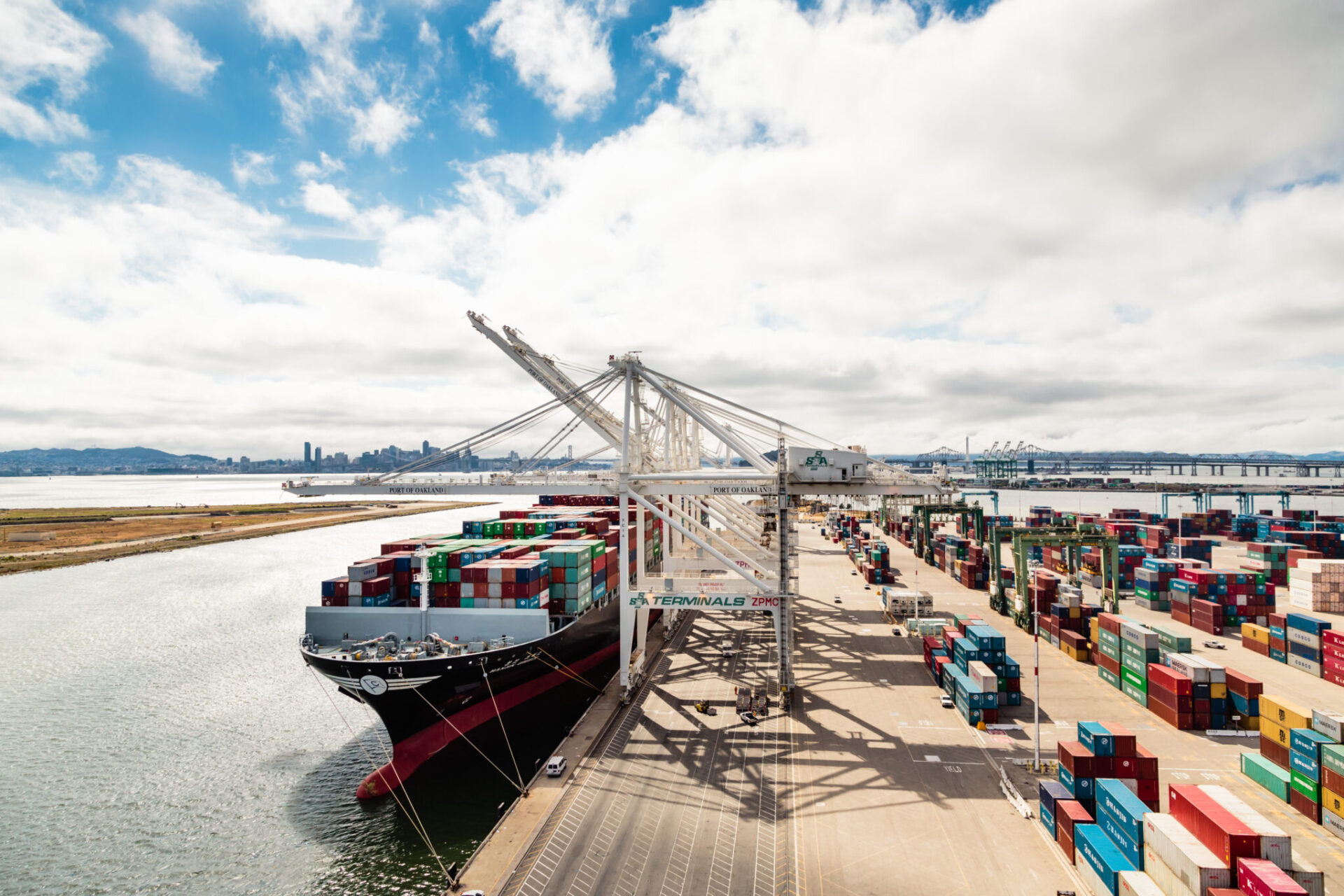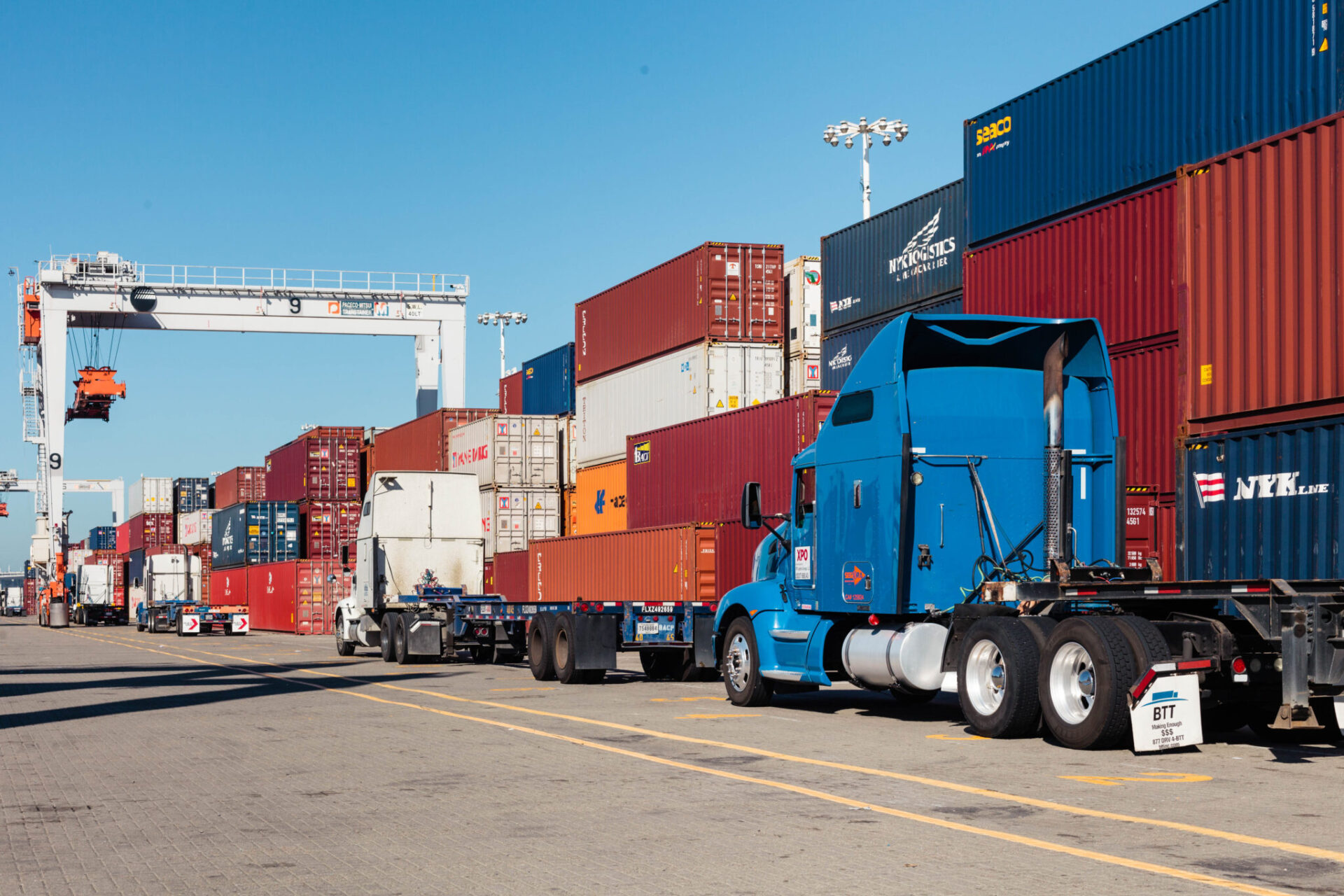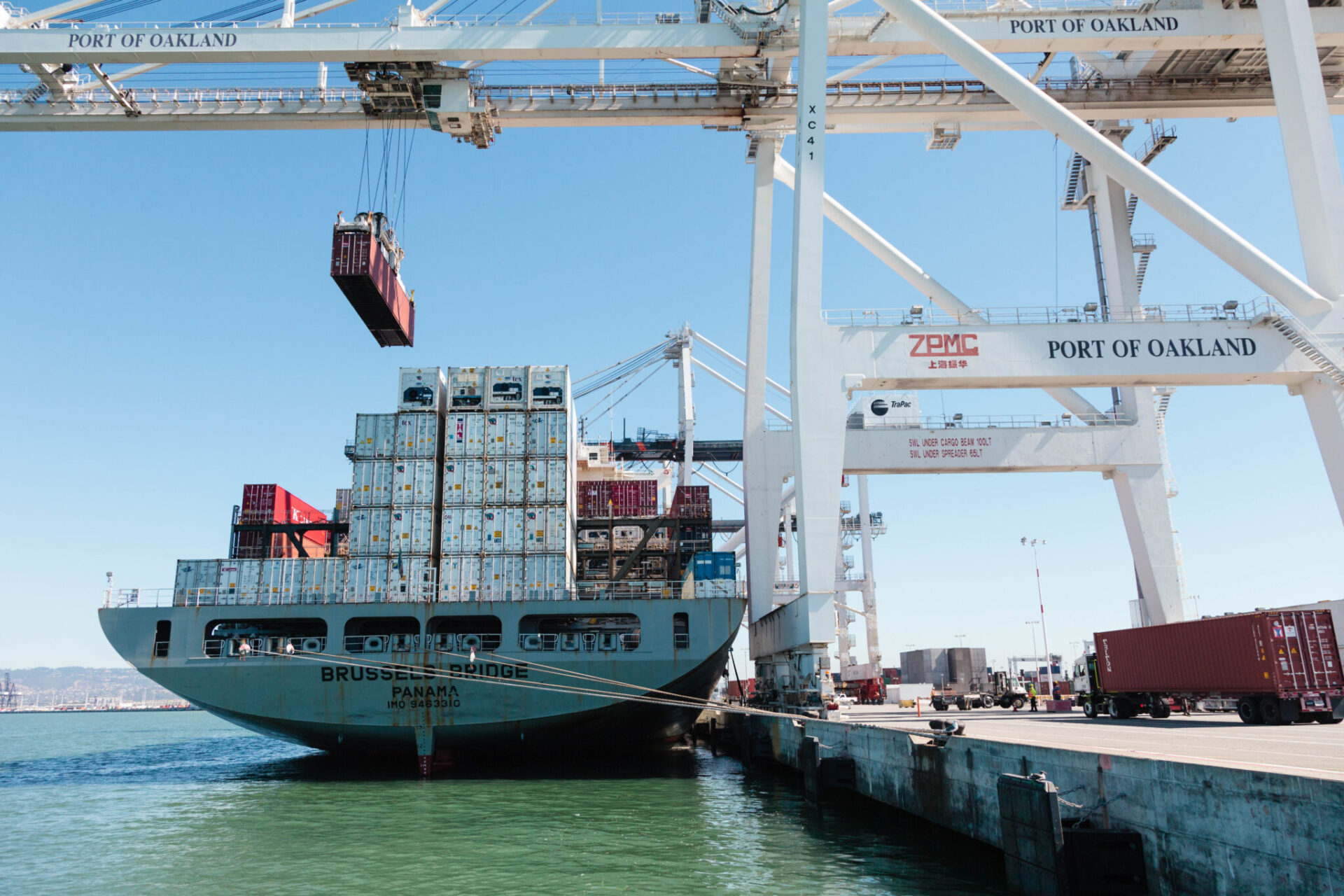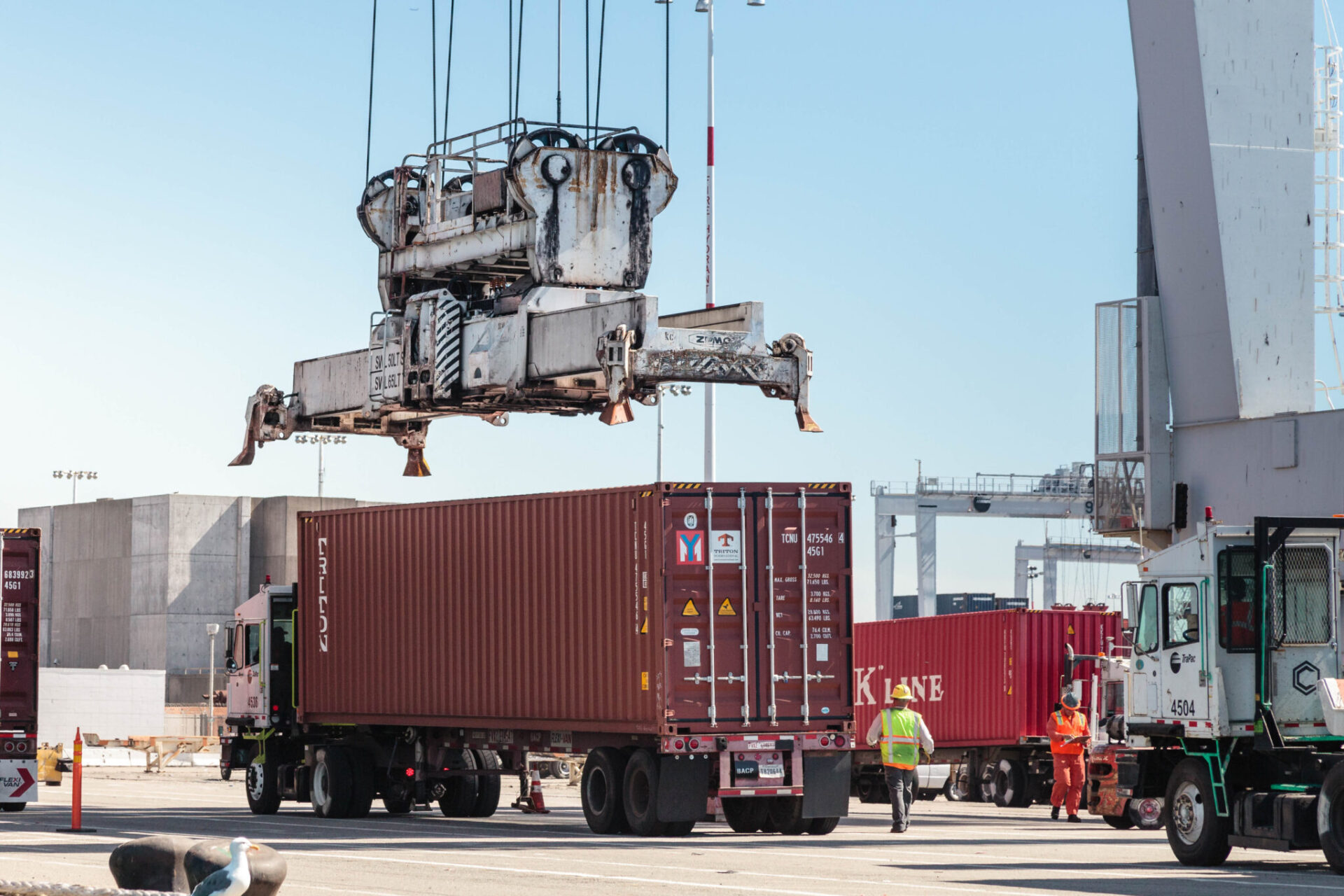
In more than 20 years of exporting tree nuts from California, Jim Zion of Meridian Growers has experienced port strikes and other shipping problems.
Such headaches come with the business of selling almonds, pistachios, pecans and walnuts to Meridian Growers’ 60 worldwide customers.
“But it’s never been this bad,” said Zion, managing partner at the Madera-based company. “And we’re not the only ones. Everybody is in the same boat.”
Zion is referring to the crisis that California, Oregon and Washington agricultural exporters have been confronting at West Coast ports since last fall. At issue are inadequate access to shipping containers, shortages of truckers and warehouse space at ports, shipment delays and cancellations, increased costs and fees, and unhappy overseas customers.
The pressures have overwhelmed marine terminals at the ports of Long Beach, Los Angeles, Oakland, Seattle and Tacoma. Dozens of export-dependent U.S. commodities, including almonds, pistachios and walnuts, have been pulled into the logjam.
“There are disruptions all the way through the supply chain,” said Zion. “If this doesn’t get resolved by the time the almond harvest starts in August, things are going to get ugly.”

‘At Breaking Point’
The port crisis is the result of “a perfect storm of events,” said Geoffrey Bogart, principal specialist in Global Technical and Regulatory Affairs for the Almond Board of California.
Among the problems:
The COVID-19 pandemic has upended the shipping industry.
Lockdowns and other restrictions closed ports, shipping offices and more. That resulted in severe backups, disrupting every link in the maritime supply chain.
Moreover, American demand for imported products has reached record levels as consumers shift toward mass home delivery. Since last summer, import cargo has flooded into the U.S. in unprecedented volumes, while foreign demand for tree nuts and other U.S. exports has been strong, said Peter Friedmann, executive director of the Agriculture Transportation Coalition (AgTC) in Washington, D.C.
The robust import-export demands have caused congestion in and around ports as well as uncertainty about schedules and container locations and availability.
The “import surge has placed many terminals, rail and trucking networks at breaking point,” said Paul Snell, CEO of British American Shipping, LLC. The company is a major freight forwarder serving California’s nut, dried fruit and fresh produce industries.
There are extended delays at ports.
Waits to berth vessels at Long Beach and Los Angeles terminals have been lasting between eight and 15 days, Snell noted. At one point in March 2021, more than 140 cargo ships were waiting to unload at the two Southern California ports. In late May, the Port of Oakland in Northern California had 28 vessels awaiting a berth.
The bottleneck of ships waiting at ports has, in turn, affected people like Bill Carriere, CEO of Carriere Family Farms, a California walnut producer and handler. The company, based about 90 miles north of Sacramento, uses the Port of Oakland almost exclusively for its export shipments.
“Shipments are severely delayed,” Carriere said. “We are booking cargo at least three weeks before we expect cargo to actually sail. In addition, we are double-booking cargo with the expectation of one of the bookings being cancelled or rolled.”
When shipments get delayed long enough, customers sometimes cancel their orders completely.
“We have had shipments headed to the port, the booking gets rolled several weeks at the last minute, or the ship skips the port, or they are overbooked or whatever,” he said. “The container sits in Oakland for several weeks, and then the customer cancels the contract due to non-shipment completely out of our control. We lose a sale we thought we had and have to bring the product back, typically repack it in another package, and resell it. [That causes] months of delay for cash flow.”

Carriers are returning to China with ships full of empty containers.
Rather than wait to load containers at West Coast ports, foreign-owned carriers are returning unfilled shipping boxes to China for a quick turnaround to retrieve more Chinese-made products for the U.S. That may be more lucrative for the ocean carriers, but it has left U.S. ag shippers unable to export reliably.
“Overseas production of finished goods has grown to a higher importance than USA raw food production,” said Snell.
There are fewer ocean carriers in business.
Industry consolidation has left just 10 foreign ocean-carrier lines, down from more than 20 in the 1990s, noted AgTC’s Friedmann.
“U.S. exporters don’t have many choices,” he said. “They are completely dependent on these carriers to deliver our ag and forest production to overseas customers. Carriers are frequently declining to carry U.S. export cargo, and, when they do, they continue to impose very large additional charges, even though many of those have been deemed unreasonable by the Federal Maritime Commission (FMC).”
U.S. exporters are being forced to pay higher shipping costs.
Since January, average freight prices to ship tree nuts to places like China, India and Europe have increased by 25% to 50%, said Snell. And those numbers are likely to climb.
“Shipping prices are expected to rise through March 2022 with the record crop volumes from 2020 and those expected for 2021,” Snell said. “Trucking prices are also likely to increase with domestic fuel prices rising.”
U.S. exporters have been hit with “unreasonable” detention and demurrage fees.
Ocean carriers are charging truckers, importers and exporters daily fees, known as “detention” or “per diem”, when they don’t return the carrier’s container to the terminal within the time allotted under the contract of carriage. Those fees have been imposed “even when such delay is not the fault or even within the control of the exporter,” Friedmann said.
The carriers and marine terminals also charge “demurrage” when the trucker or shipper doesn’t remove an import container from a terminal quickly enough or returns the container to the terminals before the terminal wants it.
Exporters frequently have been stymied from moving containers to the ships by carrier and terminals actions, noted Friedmann. Such hindrances include changing ship schedules, a lack of terminal-gate appointments and failure to give timely notice of ship arrival and loading windows.
The fees, ranging from $125 to $425 per container per day, total hundreds of millions of dollars, he added.
“Most disconcerting, carriers and terminals are charging these fees even when it’s not possible for truckers or shippers to actually access the terminal to return or retrieve the container,” Friedmann said. “The fees are not only unreasonable according to the FMC investigation and rule but are jeopardizing the financial viability of exporters and importers.”
Carriere added that his business was also accruing fees from its trucking company for holding equipment.
U.S. ports offer limited operations.
A major complaint by ocean carriers is that U.S. ports aren’t running 24/7 as foreign ports do. “They are correct,” said Friedmann. “Our marine terminal gates are generally only open for 12 hours at a time, 4.5 days a week. That’s a major hindrance.”

Quest for Resolution
Led by the AgTC and member organizations representing specific commodities such as almonds, walnuts and other tree nuts, agricultural exporters are working to resolve the port crisis.
In February, 71 national and regional ag exporters sent President Biden a letter pointing out the refusals by ocean container carriers to carry export cargo from U.S. ports. The associations urged Biden and his administration to investigate whether the cargo denials violate the 1984 Shipping Act.
During March and April, more than 160 members of the U.S. House and Senate wrote to FMC Chairman Michael A. Khouri. Their letters expressed concerns over the unwillingness of vessel-operating common carriers to ship U.S. ag commodity exports from U.S. ports and the imposition of debilitating demurrage and detention fees.
On April 27, nearly 300 U.S. agriculture and forest products companies and associations delivered a letter to Department of Transportation Secretary Pete Buttigieg, calling for immediate intervention to protect U.S. exporters and their access to foreign markets. “We need action now,” the letter said. Co-signers included AgTC, which authored the letter; the Almond Alliance of California; the California Walnut Commission; Carriere Family Farms; Diamond Foods, LLC; Grower Direct Nut Company; Horizon Nut Company; Hughson Nut; Mariani Nut Company; and the American Farm Bureau Federation.
Meanwhile, AgTC and other ag exporters are pressing the FMC to enforce its “Interpretive Rule on Demurrage and Detention under the Shipping Act.” Their goal is to stop the “unreasonable” charges they say violate the rule. Ag exporters also are lobbying congressional committees to develop legislation that would statutorily prohibit such excess charges.
In addition, U.S. ag exporters are working with port management and labor to increase the hours of West Coast marine terminal gate operations to accommodate the increased shipping volumes. They’re supporting efforts by U.S. ports to expand terminal space and modernize operations to better handle the growing volume of both imports and exports. They’re also pressing ocean carriers to return to overseas ports with a greater portion of their containers loaded with U.S. products.
Many expect the port crisis to continue well into the third quarter of 2021. Efforts to end the congestion and delays can’t come soon enough for U.S. exporters like Carriere and Zion.
Until the situation is resolved, Zion said, “we’re at the mercy of the ocean carriers and the ports.”
















